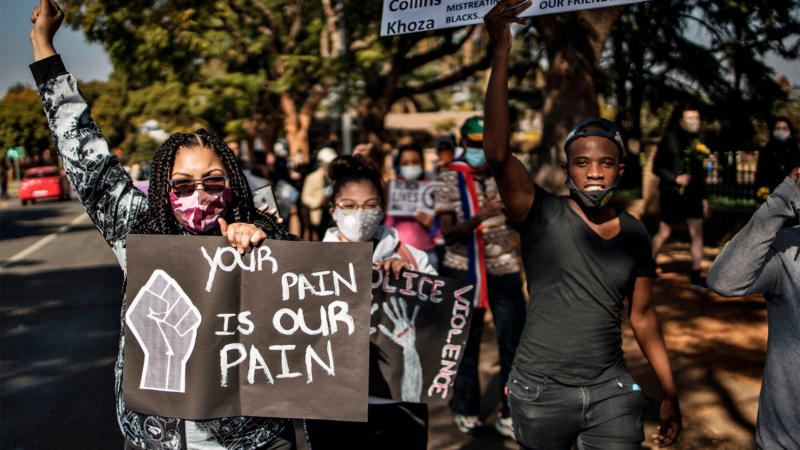As Blavity previously reported, the Black Lives Matter movement has gone global, with BLM groups and similar social movements spreading to a number of other countries. The movement has existed in the United Kingdom for some time, as Britain has a long and unique history of racism and inequality concerning its Black and brown populations. Recently, renewed protests have hit the United Kingdom; here’s what you need to know about the demonstrations and the underlying state of racism and attempts to address disparities in the country.
British citizens are shocked by the strip search of a Black teenager.
People across the U.K. have been outraged by a report that a 15-year-old Black girl was strip-searched at her school in East London. The girl, who has been publicly identified as Child Q, was taken to an office after school officials claimed that she smelled of marijuana. She was then searched by two female officers of the Metropolitan Police, who forced her to remove her clothes and even her sanitary pad and invasively examined her body; no drugs were found in the search. This experience, which has reportedly left the girl traumatized, occurred in December 2020 but has recently become a major story. The student is in the process of suing the police department and the school over the harm inflicted by the search, which Ngozi Fulani, CEO of the nonprofit Sistah Space, said was tantamount to child abuse and sexual assault.
Child Q's story has brought Britons to the streets.
Earlier this week, thousands of British citizens came out to protest against the Metropolitan Police on behalf of Child Q. The protesters, who believe that a white girl would not have been given this treatment, displayed signs with messages such as “hands off our bodies,” and “no to racist police” as they marched in solidarity with the anonymous schoolgirl. The Metropolitan Police have apologized for the officers’ actions, as has the school, which is not being publicly named to help protect the girl’s identity. Both institutions have claimed to have made changes to their leadership and policies after the incident, though many remain skeptical that real reforms have taken place.
Beyond the police, racism is pervasive in many British institutions.
The revelations about the treatment of Child Q come at a time when the U.K. has been dealing with racism throughout the country. After extensive documentation of persistent racism from both coaches and fans of cricket, a government report recently recommended withholding public funding for the popular sport unless the England & Wales Cricket Board cleans up the sport. Additionally, the Royal Society of Chemistry recently reported findings of pervasive racism in the academic field, with nonwhite researchers receiving significantly less funding for their projects, among other incidents of discrimination. In a stark display of racial disparity, there is only one Black chemistry professor in the entire country.
Even the British royal family continues to fail at not being racist.
The pervasive racism in Britain seems to go to the very top of British society. The British royal family and the British media, for example, have both been accused of racism for their treatment of Meghan Markle, the Black American actress who married Prince Harry in 2018. After relentless hostility against Markle in British media and reports of racist remarks made by royal family members, Meghan and Harry renounced many of their royal duties in 2020 and moved to the United States, where they now live with their two children. Even with Harry and Meghan gone, the royals continue to face accusations of racism; for instance, Prince William and Kate Middleton faced criticisms and protests during their recent trip to the Caribbean, where their interactions with local people were called inappropriate and racially biased.
Black and brown people are disappointed in the government's response to racism.
In 2020, the Black Lives Matter protests that swept across the U.S. after the death of George Floyd also hit the U.K., with British people coming out in solidarity with Americans and protesting their own experiences with racism in their country. At the time, British Prime Minister Boris Johnson recognized their concerns and promised to address the issues.
Nearly two years later, most nonwhite Britons don’t think the government has lived up to this promise. The Independent reports that a survey taken by the British advocacy group Hope Not Hate shows that only about one in five minority Britons believe that Johnson has kept his word. Members of the opposition Labour Party have also criticized the government’s plans to tackle racism, saying that current plans are “either too weak or too slow.” Furthermore, among ethnic minorities in Britain, more than half have experienced or witnessed some form of racial abuse in the last year, according to the survey. These results show the enduring problem of racism in the country.
The treatment of Child Q, horrible on its own, is also a terrible example of a much larger problem. Until British leaders and institutions truly get serious about recognizing and ending racism and racial disparities in the country, similar incidents will sadly continue, and Black and brown Britons and their allies will continue to protest for real change in the country.

